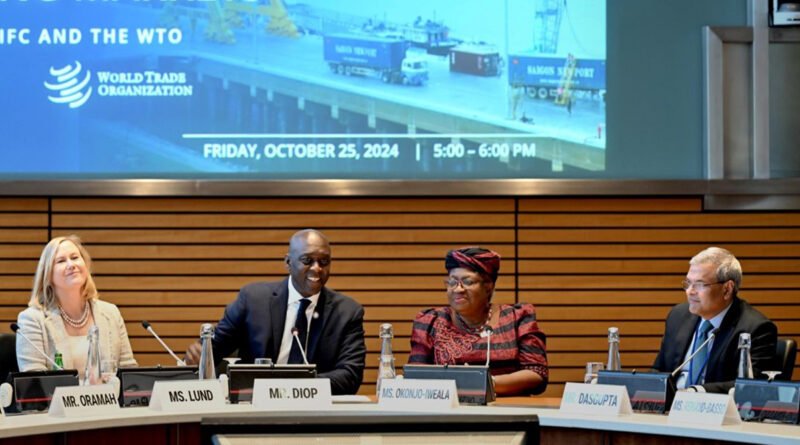DG Okonjo-Iweala: Increasing supply chain finance empowers small businesses to boost trade
Speaking at a roundtable with heads of multilateral development banks (MDBs) on the sidelines of World Bank Group and International Monetary Fund annual meetings in Washington D.C. on 25 October, Director-General Ngozi Okonjo-Iweala highlighted the critical role of supply chain finance in integrating small businesses from developing countries into global trade. She commended the progress made by the WTO and International Finance Corporation (IFC) in promoting supply chain finance and supported the next steps agreed by MDBs to improve access to finance. IFC Managing Director Makhtar Diop co-hosted the event.
The Director-General noted the substantial work carried out by the WTO-IFC team over the past few years to improve access to supply chain finance, including advancing principles for green trade finance, digitizing trade finance, promoting services provided by correspondent banks, and providing technical assistance.
Supply chain finance refers to financial arrangements unlocking working capital and easing financial burden on suppliers in global value chains. This includes the discounting of suppliers’ invoices by a bank or financier, allowing businesses to borrow against the value of their outstanding invoices.
DG Okonjo-Iweala emphasized that multilateral development banks have increased trade and supply finance support from US$ 30 billion annually before the COVID-19 pandemic to nearly US$ 50 billion last year, helping ensure the supply of essential food, medicine and other critical imports. She also pointed out that global supply chain finance, one of the fastest-growing segments of trade finance, is now valued at around US$ 2.3 trillion.
Despite the growth of trade finance, she noted, small businesses in developing countries have not fully benefited from this expansion due to challenges such as weak legal frameworks, inadequate technological infrastructure, and high costs. In Viet Nam and Cambodia, for instance, “only 0.5 per cent of their trade is supported by supply chain finance from local financial institutions,” which limits their ability to move up the value chain.
DG Okonjo-Iweala further highlighted the potential for small businesses to grow through increased access to supply chain finance. “WTO research shows that a 10 per cent increase in the use of international factoring — the main type of supply chain finance used by small businesses to secure immediate cash against unpaid invoices — can boost countries’ trade by 1 per cent,” she explained.
At the meeting, she noted the commitment by multilateral development banks to coordinate activities, with a view to increasing financial support through their existing supply chain finance programmes and taking concrete measures to support the legal, policy and operational framework needed for market development. This includes working with financial institutions to increase the diversity of financing products available to small businesses.
These efforts, she noted, will help to make trade more inclusive and competitive, ultimately leading to “greater gains from trade and higher development and poverty reduction outcomes.”
Mr Diop praised the strong partnership built between the WTO and IFC on trade finance over the past few years and the outcomes achieved in addressing the critical challenges facing small businesses.
“Supply chain finance is crucial for empowering emerging market firms, especially SMEs, to engage effectively in both local and global value chains. By providing access to vital financial resources, it enables these businesses to thrive, fostering growth, and generating quality job opportunities,” he said.
Senior officials from leading MDBs, including the European Bank for Reconstruction and Development (EBRD), the African Export-Import Bank (Afreximbank), the Asian Development Bank (ADB), the Islamic Development Bank (IsDB), and IDB Invest (the private sector arm of the Inter-American Development Bank), participated in the high-level discussion. They shared their experiences in expanding supply chain finance and discussed strategies to narrow trade finance gaps and help small businesses better integrate into global supply chains.
At the end of the meeting, the participants made a joint statement, pledging to strengthen cooperation among this group of institutions by creating a joint group with the aim of leveraging resources for supporting SMEs in supply chains and advancing practical work in the area of technology infrastructure, analytics, training and financing.




